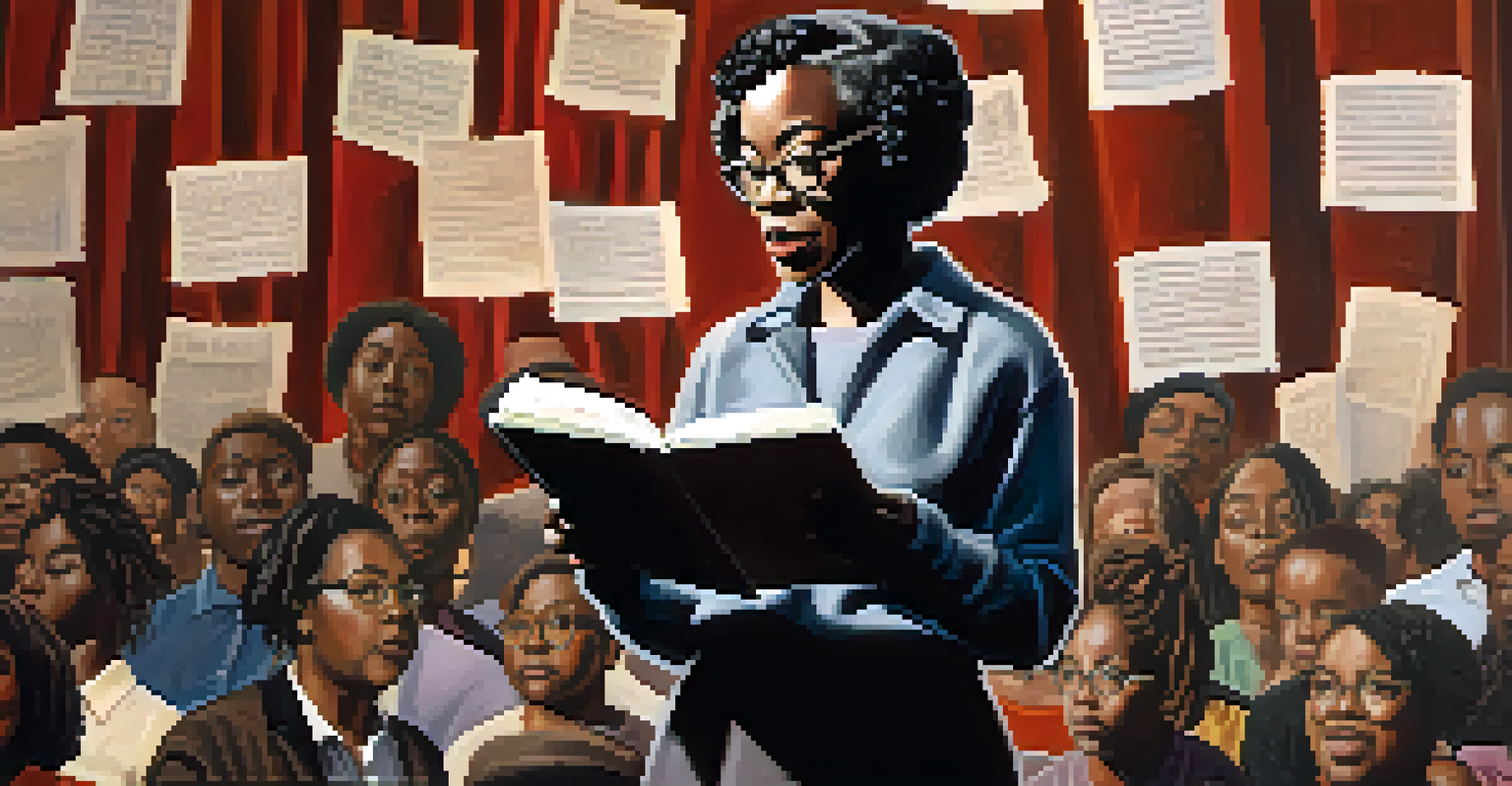Gwendolyn Brooks: Chicago's Poet Laureate and Her Impact

Introduction to Gwendolyn Brooks and Her Chicago Roots
Gwendolyn Brooks was born in Topeka, Kansas, but her heart belonged to Chicago, where she spent most of her life. The vibrant city, with its rich tapestry of cultures and communities, deeply influenced her work and themes. Brooks became a voice for the people of Chicago, capturing the essence of their struggles and triumphs through her poetry. This connection to her city not only shaped her identity but also led to her designation as Chicago's Poet Laureate.
I think it is a wonderful gift to give yourself and others. It is a way of being, a way of thinking, a way of acting that is a gift to the world.
From the bustling neighborhoods of Bronzeville to the quiet corners of parks, Brooks found inspiration everywhere. Her poetry reflects the daily lives of those around her, often highlighting the challenges faced by African American communities. By weaving local experiences into her verses, she created a powerful sense of place that resonates with readers even today. Her love for Chicago was not just in her words but also in her actions, as she actively engaged with the community.
As Brooks rose to prominence, she became a symbol of hope and resilience for many. She showed that poetry could be a tool for social change, addressing issues like racism, poverty, and identity. Her commitment to her roots and her community earned her a special place in the literary world and the hearts of Chicagoans.
The Significance of Her Breakthrough Work, 'A Street in Bronzeville'
'A Street in Bronzeville,' published in 1945, marked a turning point in Brooks's career. This collection of poems painted vivid portraits of life in Chicago's Bronzeville neighborhood, highlighting both its beauty and its struggles. The work was groundbreaking as it represented the voices and experiences of African Americans at a time when they were often marginalized in literature. Brooks's ability to capture the essence of her community made this collection a landmark in American poetry.

In this collection, Brooks used rich imagery and relatable characters to draw readers into the world she knew so well. Each poem feels like a window into the lives of her neighbors, showcasing their joys and sorrows. This authenticity resonated with readers, allowing them to see themselves reflected in her work. The success of 'A Street in Bronzeville' not only established Brooks as a significant literary figure but also opened doors for other African American writers.
Brooks: Voice of Chicago's Community
Gwendolyn Brooks's poetry reflects the struggles and triumphs of Chicago's diverse communities, making her a powerful voice for social change.
The impact of this collection extends beyond its pages. It challenged the literary establishment to recognize and celebrate diverse voices, paving the way for future generations of poets. Brooks's work remains a testament to the power of storytelling and the importance of representation in literature.
Brooks's Unique Style and Poetic Techniques
One of the hallmarks of Gwendolyn Brooks's poetry is her unique voice, characterized by sharp imagery and rhythmic precision. She often played with form, using traditional structures like sonnets while infusing them with contemporary themes. This blend of old and new not only showcased her technical skill but also made her work accessible to a wider audience. Readers could feel the pulse of her city in every line, as she expertly captured the cadence of urban life.
Poetry is life distilled.
Brooks was also a master of language, using concise yet powerful words to convey deep emotions. Her poems often reflect a keen observation of the human experience, whether it's the complexities of love, grief, or aspiration. By focusing on the everyday lives of her subjects, she created a sense of intimacy that draws readers in. Her ability to convey profound truths in simple language is part of what makes her work so enduring.
Furthermore, Brooks's use of narrative elements in her poetry allows readers to connect with her characters on a personal level. She often tells stories within her poems, inviting readers to witness the lives of those she portrays. This storytelling aspect not only enriches her work but also serves to highlight the shared experiences that unite us all, regardless of our background.
Gwendolyn Brooks: A Trailblazer for African American Writers
As the first African American to win the Pulitzer Prize for Poetry in 1949, Brooks broke barriers and paved the way for countless writers. Her recognition was not just a personal achievement; it sent a powerful message about the importance of diverse voices in literature. Brooks's success challenged the predominantly white literary canon and opened doors for other marginalized writers to share their stories. She became a source of inspiration for many, proving that talent knows no boundaries.
Brooks actively mentored young poets, encouraging them to embrace their unique voices and experiences. She believed that poetry could be a means of empowerment and self-expression. Through workshops and community programs, she nurtured emerging talent, fostering a vibrant literary community. Her commitment to uplifting others ensured that her legacy would continue through the voices she helped cultivate.
Trailblazer for African American Writers
As the first African American to win the Pulitzer Prize for Poetry, Brooks broke barriers and inspired future generations of writers.
Through her work and mentorship, Brooks not only transformed the literary landscape but also instilled a sense of pride in her community. She demonstrated that poetry could be a powerful tool for social change, allowing writers to address issues of identity, race, and inequality. Her influence continues to be felt today, as new generations of poets draw inspiration from her groundbreaking contributions.
The Role of Activism in Brooks's Poetry
Gwendolyn Brooks's poetry is deeply intertwined with her activism. Throughout her career, she used her platform to address social injustices and advocate for change. Her work often reflects the struggles faced by African Americans and the broader fight for civil rights. By shedding light on these issues through her art, she brought awareness to the challenges her community faced, encouraging others to take action.
One of her most notable poems, 'We Real Cool,' captures the essence of youth and rebellion while highlighting the consequences of societal neglect. The poem's stark imagery and rhythmic flow create a sense of urgency that resonates with readers. Brooks's ability to convey complex themes in a few short lines is a testament to her mastery of the craft. This poem, like many others, serves as a call to reflection and action, urging readers to consider the realities of those around them.
Brooks's activism extended beyond her writing as she participated in various civil rights movements. She believed in the power of art to inspire change and often collaborated with other activists and artists. Her commitment to social justice not only shaped her poetry but also reinforced her legacy as a poet who cared deeply about her community and the world at large.
Recognitions and Awards: Honoring Brooks's Legacy
Over her illustrious career, Gwendolyn Brooks received numerous awards and honors, recognizing her contributions to literature and society. In addition to the Pulitzer Prize, she was named the Poet Laureate of Illinois and received the National Medal of Arts. These accolades not only celebrate her talent but also highlight the importance of her voice in American literature. Each recognition reflects the impact she had on readers and fellow writers alike.
Brooks's influence extends beyond awards; she has inspired countless anthologies and scholarly works dedicated to her life and poetry. Educational institutions often include her work in their curricula, ensuring that new generations of students encounter her powerful words. By studying her poetry, young readers learn about the complexities of identity, race, and community, making her legacy all the more vital.
Activism Interwoven in Her Art
Brooks's work not only addressed social injustices but also encouraged activism, demonstrating the power of poetry as a tool for change.
In her later years, Brooks continued to write and speak about the importance of poetry as a means of expression. She remained a beloved figure in the literary world, sharing her insights with audiences around the country. Her unwavering dedication to her craft and her community solidified her status as a literary icon, inspiring poets to use their voices for change.
Conclusion: Gwendolyn Brooks's Enduring Impact on Poetry
Gwendolyn Brooks's impact on poetry and literature is profound and enduring. Through her unique voice, she captured the essence of her community and addressed the complexities of the human experience. Her work continues to influence poets today, reminding us of the importance of representation and authenticity in literature. Brooks's ability to connect with readers through her honest and relatable themes ensures that her poetry remains relevant for generations to come.
Her legacy is not only found in the pages of her poetry but also in the lives she touched through her mentorship and activism. By empowering young writers and advocating for social justice, Brooks demonstrated that poetry can be a powerful tool for change. Her commitment to her community and her art makes her a role model for aspiring poets everywhere.

As we reflect on Brooks's contributions, it's clear that her voice will always resonate in the literary world. She reminds us of the power of words and the importance of telling our stories. Gwendolyn Brooks will forever be remembered as Chicago's Poet Laureate and a beacon of hope for those who seek to express their truths through poetry.